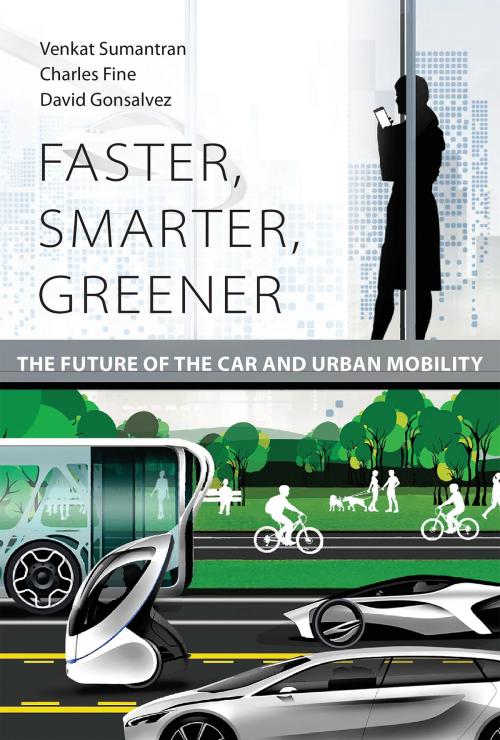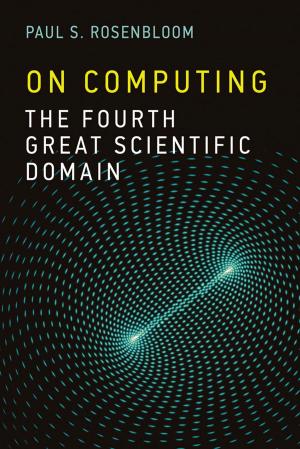Faster, Smarter, Greener
The Future of the Car and Urban Mobility
Nonfiction, Social & Cultural Studies, Political Science, Politics, City Planning & Urban Development, Reference & Language, Transportation, Science & Nature, Nature| Author: | Charles Fine, Venkat Sumantran, David Gonsalvez | ISBN: | 9780262341882 |
| Publisher: | The MIT Press | Publication: | September 22, 2017 |
| Imprint: | The MIT Press | Language: | English |
| Author: | Charles Fine, Venkat Sumantran, David Gonsalvez |
| ISBN: | 9780262341882 |
| Publisher: | The MIT Press |
| Publication: | September 22, 2017 |
| Imprint: | The MIT Press |
| Language: | English |
A call to redefine mobility so that it is connected, heterogeneous, intelligent, and personalized, as well as sustainable, adaptable, and city-friendly.
The twentieth century was the century of the automobile; the twenty-first will see mobility dramatically re-envisioned. Automobiles altered cityscapes, boosted economies, and made personal mobility efficient and convenient for many. We had a century-long love affair with the car. But today, people are more attached to their smartphones than their cars. Cars are not always the quickest mode of travel in cities; and emissions from the rapidly growing number of cars threaten the planet. This book, by three experts from industry and academia, envisions a new world of mobility that is connected, heterogeneous, intelligent, and personalized (the CHIP architecture).
The authors describe the changes that are coming. City administrators are shifting from designing cities for cars to designing cities for people. Nations and cities will increasingly employ targeted user fees and offer subsidies to nudge consumers toward more sustainable modes. The sharing economy is coaxing many consumers to shift from being owners of assets to being users of services*.* The auto industry is responding with connected cars that double as virtual travel assistants and by introducing autonomous driving.
The CHIP architecture embodies an integrated, multimode mobility system that builds on ubiquitous connectivity, electrified and autonomous vehicles, and a marketplace open to innovation and entrepreneurship. Consumers will exercise choice on the basis of user experience and efficiency, aided by “intelligent advisors,” accessible through their mobile devices.
An innovative mobility architecture reconfigured for this century is a social and economic necessity; this book charts a course for achieving it.
A call to redefine mobility so that it is connected, heterogeneous, intelligent, and personalized, as well as sustainable, adaptable, and city-friendly.
The twentieth century was the century of the automobile; the twenty-first will see mobility dramatically re-envisioned. Automobiles altered cityscapes, boosted economies, and made personal mobility efficient and convenient for many. We had a century-long love affair with the car. But today, people are more attached to their smartphones than their cars. Cars are not always the quickest mode of travel in cities; and emissions from the rapidly growing number of cars threaten the planet. This book, by three experts from industry and academia, envisions a new world of mobility that is connected, heterogeneous, intelligent, and personalized (the CHIP architecture).
The authors describe the changes that are coming. City administrators are shifting from designing cities for cars to designing cities for people. Nations and cities will increasingly employ targeted user fees and offer subsidies to nudge consumers toward more sustainable modes. The sharing economy is coaxing many consumers to shift from being owners of assets to being users of services*.* The auto industry is responding with connected cars that double as virtual travel assistants and by introducing autonomous driving.
The CHIP architecture embodies an integrated, multimode mobility system that builds on ubiquitous connectivity, electrified and autonomous vehicles, and a marketplace open to innovation and entrepreneurship. Consumers will exercise choice on the basis of user experience and efficiency, aided by “intelligent advisors,” accessible through their mobile devices.
An innovative mobility architecture reconfigured for this century is a social and economic necessity; this book charts a course for achieving it.















